Join Paul for an interview with Mariah Gladstone from Indgikitchen.
About Mariah
Indigikitchen, a portmanteau of Indigenous, digital, and kitchen, is an online cooking show dedicated to re-indigenizing our diets using digital media. Using foods native to their Americas, Indigikitchen gives viewers the important tools they need to find and prepare food in their own communities. Beyond that, it strengthens the ties to our cultures and reminds us of the inherent worth of our identities while fueling our physical bodies. Indigenous food systems support healthier ecosystems, bodies, and families.
Mariah Gladstone (Blackfeet, Cherokee) grew up in Northwest Montana. She graduated from Columbia University with a degree in Environmental Engineering and returned home where she developed Indigikitchen. Mariah has been recognized as a “Champion for Change” through the Center for Native American Youth, a “Culture of Health Leader” through the Robert Wood Johnson Foundation, and an MIT Solve Indigenous Communities Fellow. She serves on the board of the FAST (Food Access and Sustainability Team) Blackfeet. Mariah completed her Master's Degree at SUNY – ESF through the Center for Native Peoples and the Environment.
Follow Mariah
Transcript
Mariah Gladstone
PODCAST INTRO: Welcome to Pow Wow Life podcast from www.powwows.com, connecting you as a native culture since 1996. Here's your host, Paul Gowder.
Paul Gowder: Welcome back to another episode of the Pow Wow Life podcast. I'm Paul Gowder, founder of www.powwows.com. And I appreciate you being here again this week. Today, I've got an interview with Mariah Gladstone, founder of Indigent Kitchen. And she is challenging our beliefs and our way of cooking, eating, and just all of our thoughts around food and really trying to return people back to in indigenous ways of food. So it's a really thought provoking interview, and she makes it very accessible to us indigenous ingredients and mix them in to your lifestyle. So look for that in just a minute but I do have a couple of announcements. First, I am just returning from gathering of nations Pow Wow. What a week it was out in Albuquerque. Oh, it's so great to be back there seems all new, old friends, meeting some new folks. And just being back in that environment was fantastic. I'll have more on that. On next week's episode, I'm still kind of gathering my thoughts on what all happened that weekend. And so I'll talk to you a little bit more about some of the things that changed, some of the things that stayed the same. And my thoughts on just what all happened there. It was so great. And I'm glad to see Pow Wows are back. And I hope to get to see you at a Pow Wow soon. Speaking of our calendar continues to get new Pow Wows added every week. So be sure to check that often to see where you can go for your next Pow Wow trip. There's one close to you happening sometime soon. So head on over to www.powwows.com/calendar. I also want to say a special thank you, to all of you out there that are part of our Patreon community. These are the booster club of www.powwows.com people that are making a contribution each month to really help move us forward with www.powwows.com. We're using that to hire more writers, produce some really great content, having some trivia contests and other things. So thank you for joining that. I really do appreciate it. So thanks goes out to some of our new members of the Patreon community. Judy, Beth and Eleanor, Jean, Jackie and Joseph. Thanks, guys. If you want to be part of that community, and see some of the cool things we're doing over there, like monthly zoom calls with everybody, and some really exclusive rewards, you can only get it on of our Patreon head over to powwowsnation.com to find out more. Make sure you stay tuned at the end of the episode, I'll have this week's trivia contest and a couple more announcements. But for now, let's hear from Mariah Gladstone of Indigent Kitchen.
Paul Gowder: So I watched one of your talks today. And I love the fact that you're talking about decolonization and that's a big topic right now. There's a lot of people talking about how we, I'm sorry, de-colonization that's the word I was looking for, I think but nobody is talking about how it relates to food. So when you start talking about that, what is the reaction? What are you hearing back from the audience's that you're speaking to about this kind of topic?
Mariah Gladstone: Yeah, I think a lot of people are really interested in this idea of a return to indigenous food-ways, and a revitalization of our ability to feed ourselves. So, instead of decolonization, I'll actually talk about the re-indigenisation of our diets, because we're recognizing that we can use these tools that our ancestors have, but we can use them to move forward into the future, rather than going back and trying to undo colonization. Is that something super, people are super interested in.
Paul Gowder: Yeah, I like the idea of rocking and more in a positive light than the negative. That's great. All right, well, let's back up. So how did you get started in food, I guess, tell me a little bit about your background. And you know, really how you got started into cooking and this this type of thing?
Mariah Gladstone: I was really lucky that my mom had me cooking a lot in the kitchen growing up. And it was her secret way of teaching me fractions. And, of course, then I understood the basic concepts of what went into food. And she let you experiment even as a little kid. So I have recipes written down in marker with no sensor reason behind the spellings of words. But I was able to experiment and put things together. And even though my undergraduate degree is not at all involved in food, I, of course, had to cook I had to feed myself to get through college. And I began to experiment a lot more with food, as well as using it just as a stress reliever baking crew friends, and being able to share that experience and share meals. And then of course, when I returned back to my home community after my undergraduate degree, I was able to get a lot more access to the traditional foods here in Montana, but also recognize that disconnect that we have from access to foods as well, this idea of like, cook food desert, but also, you know, the need to restore knowledge around traditional foods and how to use them and how to harvest them and how to cook them.
Paul Gowder: Yeah, you know, listen to that talk. And you mentioned that where you are, there's only two grocery stores that sell fresh fruit. That's crazy in such a vast area. But it is, I mean, even here, I mean, I live in a fairly metropolitan area, even though I'm out in the suburbs, but it's still easier to drive by Chick-fil-A at night, then to stop and, and cook the meal with real food as you're talking about. So I guess the challenge of time and an ease, I mean, so what are the shortcuts to really help people get into this kind of habit?
Mariah Gladstone: Yeah, I think that obviously, you know, out here, it's probably a town pump deli filled with Joe Joe's and chicken strips and stuff like that. And that's the easy meal that people could go to. But people ultimately want to be eating healthy foods, they want to feed their kids healthy foods. That goes without saying. But often, that can be a challenge, especially when people are exhausted at the end of a long work day. And just preparing a meal in the kitchen can be tiring in itself, especially when everyone's hungry and just wants to eat. So I try putting out recipes that are very achievable for folks to do. I'll use of course, the tools of the modern kitchen. You know, whether that's putting things in a slow cooker at the beginning of the day, so you have food ready at the end of the day, whether that's an Insta pot, or a pressure cooker, and rapid cooking something, whether it's you know, just being able to get kids involved in the kitchen, you know, if you have a kid that can grind up zucchini noodles, and can turn squash into essentially a spaghetti hack, then you're getting kids involved too. And that gives them ownership over the meal as well. And, you know, I'm of course looking at things that people recognize as foods they enjoy as delicious. I'm not looking for five star dining and just trying to make things that people will be able to do when they get home from work at the end of the day.
Paul Gowder: That's awesome. So and, you know, I've talked to a lot of people lately, of course, and with their businesses and in all the challenges over the last couple years it hurt a lot of businesses, but I'm imagining with the pandemic and people really wanting to do more at home you know, you hear the stories of like Home Depot had massive sales because everyone's doing home projects and during COVID, did you find more people turning to cooking and trying to find better ways to prepare their food?
Mariah Gladstone: For sure, there were a lot of issues, especially at the start of the pandemic that really identified some key problems in the supply chain. And how susceptible indigenous communities were to breakdowns within that transportation system. And so we of course, like many places ran into shortages and escalated prices and things of that sort. But the intensity of those problems forced people into looking for alternatives. And so, now I can say that we could go to one of the grocery stores on the reservation, and we can buy Blackfeet raised bison from our tribal herd and have access to that resource and it's 799 a pound, which is cheaper than you can buy bison at Costco, two hours away in the big city. And so, you know, that's something that our nation started looking at. We're like, how do we deal with us? How do we manage the concentration in the meatpacking industry and challenge that system and give the quality meat to our people that we're raising here. So that, you know, there were things like that, that were really, you know, the problems because they became so extreme, it forced us to find solutions. Similarly, you know, I serve on the Board of Fast Blackfeet, which stands for Food Access and Sustainability team. And we run one of the food pantries in browning. But part of that work besides food pantry, per work and emergency food supply system, has been building gardens and starting people growing, right last year, it was native plants for teas, so that people had access to healthy beverages. And this next year, it's vegetables, and then being able to sell the vegetables to the food pantry, so that they can distribute them to folks. So that they can start farmers markets, and we can have fresh vegetables that are grown in this community. So there's things like that, and being able to really offer those resources and change the way in which we're getting food and we're supplying food to our nation.
Paul Gowder: That's awesome to hear that, that your nation has taken that stand, you know, the concept of, you're not sovereign, until you can feed your own people. That's a pretty challenging concept, when most tribes are still struggling with financial sovereignty, or even just government sovereign, you know, being able to govern themselves. But you're right, we have to start looking at those things. And I don't think the food is going to get any easier, you know, you hear with climate change, and other things that our food supply is going to be a challenge here soon. So you have to become self-reliant. I love hearing that. As you travel, and I know you do some other talks, how are other nations, do you know if other nations are starting to move toward this?
Mariah Gladstone: I think almost every indigenous nation on Turtle Island has interest in food sovereignty. I think it, of course, requires some long term planning. And so many of our communities have been focused on immediate survival. And so, you know, sometimes to do that long term work that is needed, we have to be in a place where we're ready to do that. And so not every nation has started to, you know, put in long term food sovereignty clients or thought about their own gardens or what that takes but everyone's interested in it. And so I think that's part of the reason that indigene kitchen resonates for so many communities. But also, you know, I think, when we look at the history of food systems in all North America, we know that food systems were very intentionally targeted by colonial governments, so that native people would not be able to push back against colonization and land theft. And, I mean, there were laws passed in Congress, which said that if you didn't send your children to boarding school, your rations would be withheld. So I mean, everything is connected to food systems, and that idea of food sovereignty is essential to our political sovereignty too. And so as we recover that we also recover this ability to push back against colonization if we're not relying on subsidized food programs to feed our communities, we're able to be a lot more active in this broader space. That said, there are a lot of amazing food sovereignty programs that are light-years ahead of where even we are here on Blackfeet Nation. I know, the Oneida Nation of Wisconsin Menominee. I was like Wisconsin, Great Lakes, tribes are doing some amazing things. Red Lake Nation, I've seen some amazing stuff happen from some West Coast tribes, these folks that are doing work to build food systems that are ran by the tribe, or they're supporting tribally owned businesses. And, you know, they're creating amazing systems, I think it's Menominee that has an aquaponic system. So they're raising fish in a greenhouse. And then that's feeding plants in the greenhouse as well. I know that Red Lake has a, they have, of course, wild rice, and they have their fisheries, and they have wild harvested berry sauces, and value added products made with their wild plums, and chokecherries and all of these amazing foods. You can go order pancake syrup made with their wild blueberries, and whatnot. And so they're really cool things like that happening. But there's also indigenous producers, like I know of several folks that are fishers and run, I was gonna say Fisher men and women that run their own businesses that are native. So it's not tribally owned, it's owned by individuals. But they're being bought by their tribes, or they're supported by the intertribal Agricultural Council and their American Indian foods program. So there's a lot of work being done. And folks are excited about it, you know, across Indian country, we have the ability to support each other's food enterprises. There's a wonderful woman that runs Sakkari farms out in Oregon, and she makes like cedar smoked salt and hot sauces. And so I'm like, “Yes, Native Owned Hot Sauce Company”. And I'm able to support that stuff. And, you know, support that value added product, but she's also growing all of those foods. And, you know, peppers, chilies are, of course, an indigenous food from Mexico. And so we're looking at these ancestral foods and these connections and the ways in which they can inspire us and power us forward today.
Paul Gowder: That's great. So a friend of mine sent me a basket of stuff from Red Lake. And so it had some of their jams. It had this really great hot seasoning salt, and some wild rice and that stuff was fantastic. And they're doing some really great stuff up there. Well, tell me about how did the idea come about for your website, Indigent Kitchen? How did that sprout up?
Mariah Gladstone: Yeah, I was actually at a food sovereignty conference. Again, a whole bunch of natives talking about food sovereignty. And a lot of the talk at that time, this was in 2016, I think, was about revitalizing and we’re restoring our access to foods, this idea of food desert, and the idea that we don't have enough grocery stores. And that, of course, is an issue. But also, you know, it comes with this multi-generational history of our food systems being taken away from us, and being forced into relying on government subsidized food systems, so that we forget all of our traditional knowledge that's taken from us, it just didn't just disappear. It's stuff that was really intentionally disconnected, so that we wouldn't be able to feed ourselves. And so as we look at restoring access, we also have to connect that with a restoration of knowledge, we have to know how to cook our wild plants, we have to know how to butcher wild game, we have to know how do we plant our seeds so that we're not depleting the soil? How do we harvest things and save them so that we can eat them into the winter? So all of that knowledge has to come with the access work. We know people are excited about foods, but they need to know what to do with them. And a lot of recipe books can be really French based in terminology. They can be hard to access for folks that didn't necessarily grew up reading cookbooks. And so I came up with the idea for an indigenous Digital Kitchen indigent kitchen and started making videos using the janky camera equipment and the camera skills I was able to learn off of YouTube and I started making my own YouTube videos.
Paul Gowder: I think, and so now you've got a plethora of recipes and videos out there. So you're right about the recipe books, I had not thought about that, but they are written from a certain perspective. And they I mean, I find if I ever tried to do that, fortunately, I have a wife that cooks much better than I do. But you read even simple instructions, you know, it is confusing. So how are you overcoming that on your website and really making it accessible to anybody?
Mariah Gladstone: Yeah, I work hard to, I mean, of course, use layman's terms whenever possible, but also a couple everything with videos, so that people can not only have instructions written down, but also be able to see what that means? If I'm describing cutting up a butternut squash so that it's in, so that a thin lasagna noodle shape, it really helps to have a video that goes with that, that helps you go, oh yeah, I can do that which makes it that much more achievable. And yes, cookbooks can be super unfriendly, if you don't know the terminology. And when I was growing up, we obviously didn't have smartphones in our pockets, so we weren't able to Google every word very easily. And so I remember a neighbor calling me and freaking out, because she was trying to prepare [inaudible 21:19] and she didn't know if she had a sauce pan. This isn't like seventh grade. I'm like, it's just a pot. But we don't use the term sauce pan in rural Montana for just describing our basic pots. And so I had to rescue her on that. But it's so funny because it's this information that can be just out of people's reach. And it's is what I'm doing to try to make it much more accessible so that folks realize how easy it can be.
Paul Gowder: And you're right, we don't call them that here in the South either, they're just pots, get the big one or get the small and it's about. So in somebody new, hopefully, there's people watching now that are learning about your website for the first time. So a new visitor coming, how do they get started? What's the best way to really get into your cooking and in this whole style of thinking?
Mariah Gladstone: Yeah, I, of course, look at the things that I have access to. And you know, whether that's fresh, harvested greens from outside the door. And you know, for me in Montana, that's going to be different than folks in the South, for example. But I do have access to wild game meat. I'm really lucky here. So I have deer and elk. And now I could buy bison in the grocery store, which is awesome. But it's finding ways to use those things. And a lot of the times, what I will do is I will make recipes that people are familiar with. So of course we know Indians love spaghetti, right. And so we can obviously substitute everything in spaghetti for indigenous ingredients, right. Tomatoes are indigenous, like this whole idea of red sauce was taken from Native people to begin with. So we're just reclaiming it. As for pasta, there are so many indigenous substitutions for pasta, right. I already mentioned zucchini noodles, which is just essentially cutting up a zucchini like noodles and there are special tools called spiralizers that will do it quickly. But you could take a vegetable peeler and just peel the zucchini into little noodles like that. You could add carrot noodles if you wanted to. And then you just cook them up in a pan for you know, five minutes and then you have delicious spaghetti noodles that are sweet but also a vegetable, so you don't have to feel guilty about it. And then you can put bison if that's what you have. You could put venison burger if that's what you have. You can put, you can make a vegetarian, you can use bell peppers, which are of course more indigenous foods. And you can of course indigenize your seasonings if you want to. There's tons of different indigenous seasonings, everything from Cedar to Wild Bergamot which has like almost an oregano flavor. There's of course peppermint if you want to see some things with peppermint. There's Yarrow, which tastes like Tarragon just trying to compare things to colonial versions of these things which I don't need to, I don't need to do that. Not everything needs to be framed in terms of colonial foods. But it's definitely you know, and then of course you can look up ancestral recipes, what have people have been making for 1000s of years. So you know, look in the Great Lakes and wild rice with berries and maple syrup and a sweet dish and you know, be able to utilize a recipe that's been made like that for 1000s of years and powered people and fed people and kept nations alive. So, you know, there are different ways of looking at food, and they're you know, cookies that we can make with sunflower seeds and maple syrup and you know, be able to connect with all of these delicious foods, and take the ancestral wisdom, the agricultural knowledge, and then reimagine it in our own way, culture is not stagnant, we're able to change and learn and restore that knowledge and recognize the wisdom of the past while using it today in the present, and guiding us into the future.
Paul Gowder: That's great. It seems, when you first hear the topic of, you know, trying to read indigenize you're cooking, it seems like an overwhelming topic, but you do present it in such a way that it seems a little more accessible. Alright, so you've got a great website, your YouTube videos are awesome. You've moved past the janky camera. You're doing great stuff there. So what's next now? Hopefully, things are opening up or hoping you're gonna get back out there speaking some more what is coming for you in this year?
Mariah Gladstone: Yeah, I'm super excited. I'm heading to the east coast in April, during a couple of university presentations and food demonstrations. So I'm really excited about that. I'm working with fast Blackfeet and the food pantry to teach some cooking and gardening classes. So I'm really excited about that not only how do we get things to grow in cold Montana climates, but also, how do we take all of these zucchinis that we're getting out of our garden, and then turn them into eight different types of food. So lots of fun things like that. I'm excited to be working on a children's cookbook about native foods, which I think is extra important for kids to learn how to cook, since I was lucky enough to learn when I was really young, working on a couple of different toolkits and research projects about the logistics of our food supply system, and really tedious information about trucking and transportation. But ultimately, to connect with better served grocery stores in our communities and lower food prices hopefully. So doing a lot of really fun things. And then, of course, just getting to experiment in the kitchen. So seeing if I can make macarons with pumpkin seeds instead of almonds, because and maple sugar instead of white death, right. So looking at fun things like that. But just trying to connect with that knowledge and get to cater a fundraiser for our local gardening program. Lots of really exciting stuff on the horizon, for sure.
Paul Gowder: Well, I definitely can see my address. If you need taste testers for any of that it all sounds great. In the idea of a cookbook, if you can get a kid's cookbook, if you can get kids to cooking and thinking of food this way. It's a lot easier. They don't have to re think like you know, the whole idea of going back to natural food and real food and sort of processed stuff. You can give them early on that. Oh, I love the idea of that. So please keep us updated on that too. I'd love to know more about that when it comes out. That's great.
Mariah Gladstone: Yeah, for sure.
Paul Gowder: Well, thanks for spending a few minutes with us. I love what you're doing over there Indigent Kitchen. It's a great concept and I love all your videos. So thanks for spending a few minutes with us.
Mariah Gladstone: Thank you so much. It's easy to revitalize our food systems it's easy to find indigenous foods. Three fifths of the world's food originated in the Americas. It's not hard to find native foods. So it's time that native people learn how to cook with them again.
Paul Gowder: Thank you.
Paul Gowder [CLOSING]: Alright, so who's hungry and ready to go fix saw a new meal and try one of her recipes. I loved the interview and thanks Mariah for spending a few minutes with me to talk about some of, just some of the ways we can make put indigenous recipes and cooking into our lifestyle and what you're doing to help tribes do that it's pretty, the whole idea of food independency and food sovereignty is a really interesting concept and I hope it's something that more tribes will move toward. Alright, as promised, I have a new trivia question for this week, you're competing for a prize pack, which is a whole bunch of www.powwows.com stickers. So I will draw from all of the correct answers one lucky winner before next week's episode comes out. So here is your trivia question.
Question: This weekend gathering of nations, they crowned a new Miss Indian world. The previous Miss Indian world served two terms and then they let the title go vacant for the remaining time because of the pandemic. So a new Miss Indian world was crowned this weekend. What tribe is she from?
Paul Gowder [CLOSING]: Alright, there's your question. Good luck, head on over to powwowlife.com fill out the form there to put in the correct answer. Good luck. Again, I'm Paul Gowder. I am the founder of www.powwows.com, and thank you for being part of our community. I hope you enjoy these episodes. Be sure to like us, review us on Spotify or Apple podcasts wherever you're downloading this. Thank you have a great week. I’ll talk to you soon.
PODCAST OUTRO: Thanks for listening to the Pow Wow Life podcast from www.powwows.com. Be sure to subscribe to the podcast to get notified of our next episode. Find a Pow Wow near you by visiting www.powwows.com/calendar, support www.powwows.com by visiting www.powwownation.com.
Last Updated on February 16, 2024 by Paul G
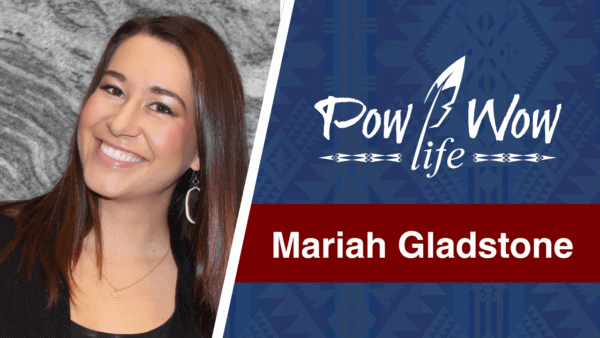
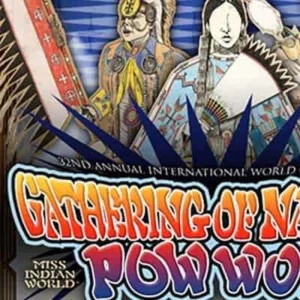
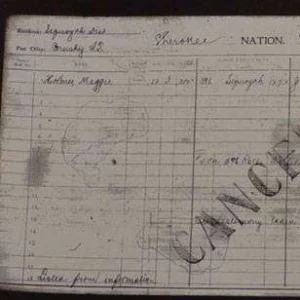
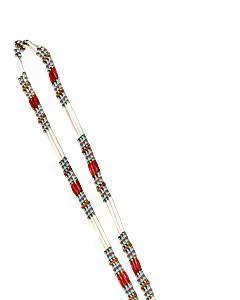
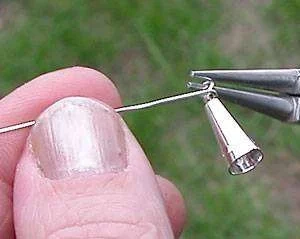
Joyce Marie Hand
says:How do I stop all of the multiple, excessive pop-ups? I have had enough.